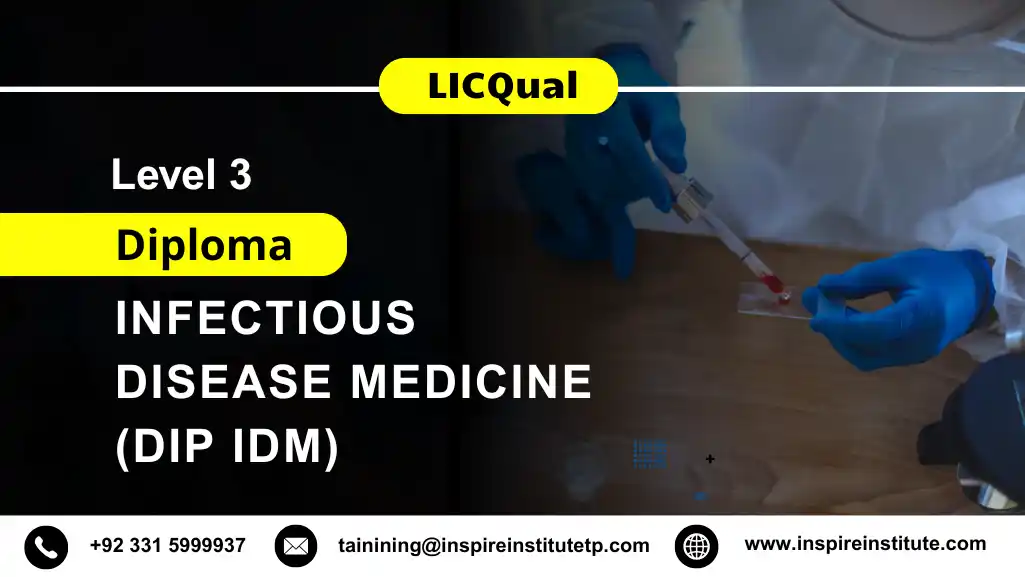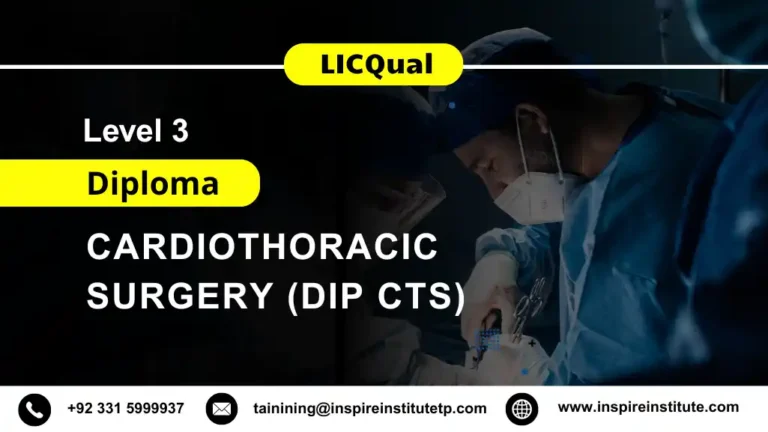LICQual Level 3 Diploma in Infectious Disease Medicine (Dip IDM)
The LICQual Level 3 Diploma in Infectious Disease Medicine (Dip IDM) is a UK-accredited qualification designed for healthcare professionals seeking to advance their expertise in the prevention, diagnosis, and management of infectious diseases. In today’s global healthcare environment, understanding infectious diseases is critical for safeguarding public health, implementing evidence-based interventions, and improving patient outcomes. This programme provides learners with the knowledge and practical skills essential for effective disease control, epidemiology, and clinical management in diverse healthcare settings.
This course offers a comprehensive curriculum covering the fundamentals of infectious disease medicine, including bacterial, viral, fungal, and parasitic infections. Learners gain insights into the latest diagnostic methods, antimicrobial therapies, vaccination strategies, and outbreak management protocols. By integrating theoretical knowledge with practical applications, the course ensures that healthcare professionals are prepared to respond efficiently to infectious disease challenges in hospitals, clinics, and community health environments.
Learners will develop practical skills in patient assessment, laboratory interpretation, infection prevention, and clinical decision-making. The programme also equips professionals to design and implement infection control strategies, conduct risk assessments, and collaborate with multidisciplinary teams to provide holistic care. High CTR keywords such as infectious disease management, infection control training, and clinical epidemiology course are incorporated naturally to enhance search visibility and relevance.
Designed as an assignment-based programme, the LICQual Level 3 Diploma in Infectious Disease Medicine offers flexible learning tailored for busy healthcare professionals. Learners can progress at their own pace while continuing to fulfil clinical duties, ensuring that professional development does not disrupt ongoing patient care. The curriculum combines evidence-based training with practical case studies to reinforce real-world application.
The course emphasizes evidence-based practice, encouraging learners to critically evaluate current research, public health guidelines, and clinical protocols. Students acquire the ability to implement modern infection prevention strategies, contribute to outbreak investigations, and enhance patient safety. This approach fosters informed clinical judgment and strengthens professional competence in infectious disease medicine.
Graduates of the LICQual Level 3 Diploma in Infectious Disease Medicine (Dip IDM) gain a UK-recognised qualification that enhances professional credibility and career prospects. Whether working in hospitals, community health, research, or global health initiatives, learners are equipped to make a meaningful impact on public health, infection prevention, and patient care outcomes, establishing themselves as skilled practitioners in infectious disease management.
This diploma empowers healthcare professionals with the expertise, practical skills, and accredited recognition necessary to excel in the critical field of infectious disease medicine, supporting both career advancement and improved health outcomes globally.
Why Choose this Qualification
The LICQual Level 3 Diploma in Infectious Disease Medicine (Dip IDM) is a UK-accredited qualification designed for healthcare professionals, clinical practitioners, and public health workers seeking to strengthen their knowledge and practical expertise in the prevention, diagnosis, and management of infectious diseases. This course combines advanced theoretical learning with hands-on applications, enabling learners to understand infection control, epidemiology, antimicrobial therapies, and outbreak management strategies essential in modern healthcare practice. Designed as an assignment-based programme, it provides flexibility for professionals balancing clinical responsibilities with academic advancement.
Key Reasons to Choose this Qualification:
Specialist Knowledge: Gain a comprehensive understanding of infectious diseases, including bacterial, viral, fungal, and parasitic infections. Learn evidence-based approaches to diagnosis, antimicrobial treatment, vaccination strategies, and outbreak control. This knowledge equips professionals to deliver safe and effective infectious disease care.
Practical Application: Develop competence in conducting patient assessments, interpreting laboratory results, implementing infection prevention measures, and managing outbreaks. Learners also acquire skills in health education, risk assessment, and multidisciplinary collaboration to ensure effective infection control in clinical and community settings.
UK-Accredited Diploma: Earn a UK-recognised qualification that validates expertise in infectious disease medicine and enhances professional credibility. Accreditation ensures alignment with global healthcare standards, making this diploma valuable for physicians, nurses, microbiologists, epidemiologists, and allied health professionals.
Flexible Learning Pathway: Benefit from an assignment-based structure that allows learners to progress at their own pace while continuing to work in clinical, community, or public health settings. This format supports busy professionals seeking academic growth without disrupting patient care.
Evidence-Based Training: Explore current research, clinical guidelines, and public health protocols in infectious disease management. The programme emphasises safe, scientifically grounded interventions, ethical practice, and effective outbreak prevention strategies to improve patient and community outcomes.
Career Development: Expand career opportunities in hospitals, clinics, research institutions, government health departments, NGOs, and international health organisations. The LICQual Level 3 Diploma in Infectious Disease Medicine equips learners to lead infection control initiatives, enhance patient care, and advance professionally within the healthcare sector.
The LICQual Level 3 Diploma in Infectious Disease Medicine (Dip IDM) empowers healthcare professionals with the knowledge, practical skills, and UK-accredited recognition necessary to excel in infection prevention and control. It is an essential qualification for those aiming to advance their careers while safeguarding public health and improving patient outcomes globally.
Course Overview
LICQual UK Awarding Body
Average Completion Time:
4-12 Months
Study Units: 6 Units
Evidence & Assignment Based
Mandatory Units
Who Should Take This Course
The LICQual Level 3 Diploma in Infectious Disease Medicine (Dip IDM) is a UK-accredited qualification designed for healthcare professionals who wish to develop advanced knowledge and practical skills in infectious disease management, prevention, and control. This course is ideal for practitioners aiming to improve patient outcomes, implement evidence-based interventions, and progress within the specialised field of infectious disease medicine. It equips learners with in-depth theoretical insights and practical approaches to infection control, epidemiology, antimicrobial therapies, and outbreak management, supporting both professional growth and enhanced patient care in clinical and community health settings.
This course is suitable for:
Physicians and General Practitioners: Clinicians seeking to strengthen their skills in diagnosing, treating, and managing infectious diseases, including outbreak response and preventive strategies.
Nurses and Clinical Practitioners: Healthcare professionals aiming to enhance their competencies in infection prevention, patient monitoring, antimicrobial stewardship, and patient education.
Microbiologists and Laboratory Technicians: Individuals wishing to develop expertise in laboratory diagnostics, pathogen identification, antimicrobial sensitivity testing, and reporting protocols.
Public Health Professionals: Practitioners focusing on epidemiology, outbreak investigation, vaccination strategies, and community-based infection control programmes.
Aspiring Infectious Disease Specialists: Healthcare professionals preparing for higher-level qualifications or specialist pathways in infectious disease medicine, epidemiology, or public health who want a strong clinical and academic foundation.
Healthcare Educators and Trainers: Professionals aiming to improve knowledge in infectious disease management to support teaching, research, or evidence-based training within hospitals, clinics, or community settings.
Healthcare-Oriented Learners: Individuals with a professional interest in infectious disease who wish to understand the principles of disease transmission, prevention strategies, and patient-centered care in infectious medicine.
The LICQual Level 3 Diploma in Infectious Disease Medicine (Dip IDM) is particularly valuable for healthcare professionals seeking to specialise in infection management, strengthen their clinical expertise, and achieve a UK-accredited qualification. By combining evidence-based learning with practical application, this diploma supports career progression, professional recognition, and the ability to meet the growing demand for skilled infectious disease practitioners in modern healthcare.
Course Benefits
The LICQual Level 3 Diploma in Infectious Disease Medicine (Dip IDM) provides significant benefits for healthcare professionals seeking to strengthen their expertise in infectious disease management, prevention, and patient care. By combining advanced theoretical knowledge with practical application, this diploma equips learners to implement effective infection control strategies, manage outbreaks, and enhance clinical outcomes. Designed as a flexible, assignment-based programme, it supports professional development while maintaining academic excellence and relevance in modern healthcare systems.
Key Benefits of the Course:
- Specialist Knowledge: Gain a comprehensive understanding of infectious disease principles, epidemiology, antimicrobial therapies, and infection prevention strategies. Learners explore common and emerging infectious diseases, outbreak response, vaccination programmes, and public health policies to make evidence-based clinical decisions.
- Practical Application: Develop competence in conducting clinical assessments, managing infectious disease cases, implementing infection control measures, and supporting patient-centered care. Learners also gain skills in outbreak investigation, laboratory interpretation, and applying best practices in hospital and community settings.
- Recognised Qualification: Earn a UK-accredited diploma that validates advanced expertise in infectious disease medicine and strengthens professional credibility. Accreditation ensures alignment with international healthcare and infectious disease management standards, making this qualification highly valued across hospitals, clinics, and public health organisations.
- Flexible Learning Pathway: Benefit from an assignment-based study format that allows learners to progress academically while managing professional responsibilities. This structure is ideal for healthcare professionals balancing clinical duties with continued education.
- Evidence-Based Training: Explore the latest research, clinical guidelines, and public health frameworks, ensuring safe, effective, and scientifically sound infectious disease management. Learners are trained to adopt preventive approaches, antimicrobial stewardship, and evidence-driven interventions.
- Career Development: Expand career opportunities in hospitals, infectious disease units, public health departments, research institutions, and international health organisations. This qualification opens pathways to roles in clinical care, epidemiology, infection control, and healthcare education.
- Enhanced Patient Care: Contribute to better patient outcomes through accurate diagnosis, effective treatment, and infection prevention. Learners acquire skills to manage complex infectious cases while protecting community health and minimizing disease transmission.
- Professional Growth: Strengthen clinical decision-making, communication skills, and interdisciplinary collaboration. This diploma prepares healthcare professionals to play a pivotal role in managing infectious diseases and improving healthcare delivery standards.
The LICQual Level 3 Diploma in Infectious Disease Medicine (Dip IDM) equips learners with critical knowledge, practical skills, and a UK-recognised qualification. It empowers healthcare professionals to improve patient outcomes, advance public health, and progress in their careers within the dynamic field of infectious disease medicine.
Eligibility Criteria
The LICQual Level 3 Diploma in Infectious Disease Medicine (Dip IDM) is a UK-accredited programme designed for healthcare professionals, clinicians, and community health practitioners who wish to enhance their expertise in infectious disease management, outbreak response, and patient care. This assignment-based qualification combines advanced theoretical knowledge with practical application, making it ideal for doctors, nurses, laboratory technicians, public health officers, and allied health professionals aiming to develop specialist skills in infectious disease medicine. By meeting the entry requirements, learners ensure they are fully prepared to succeed in the programme and apply their knowledge confidently in clinical, community, and public health settings.
Educational Background:
Applicants must hold a recognised healthcare or science-related qualification such as a medical degree, nursing degree, diploma in healthcare practice, microbiology, or an equivalent qualification. Those with Level 2 or Level 3 qualifications in healthcare, clinical science, or related fields may also be considered. Equivalent international qualifications will be reviewed on a case-by-case basis to ensure suitability for the programme.
Professional Experience:
A minimum of one year of clinical, healthcare, or public health experience is recommended. Prior exposure to infectious disease management, infection control, or epidemiology is advantageous, though motivated healthcare professionals without direct experience may also apply.
Age Requirement:
Learners must be at least 18 years of age at the time of enrolment, ensuring they possess the professional maturity, responsibility, and awareness required for advanced training in infectious disease medicine.
Language Proficiency:
Since the programme is delivered in English, learners should demonstrate proficiency in reading, writing, and communication. A minimum IELTS score of 6.0 or an equivalent qualification is recommended for non-native English speakers to ensure they can complete assignments and fully engage with course materials.
Technical Requirements:
Applicants should have access to a computer or laptop with a reliable internet connection, as well as basic IT skills to manage digital resources, conduct research, and submit assignments through online platforms.
Required Documents:
Submission of a valid ID or passport, proof of educational qualifications, and evidence of professional experience (if applicable) is required for registration. Additional documentation may be requested for applicants presenting international qualifications.
The Qualification Process
LICQual Level 3 Diploma in Infectious Disease Medicine (Dip IDM) follows a structured pathway to ensure learners gain comprehensive knowledge, practical skills, and professional competence in community oral healthcare.
Step 1: Self-Assessment
Learners review the entry requirements to confirm eligibility. Candidates with a background in dentistry, oral health, or public health are encouraged to apply.
Step 2: Registration
Complete the registration process by submitting required documents such as proof of qualifications, a valid ID, and payment of enrollment fees.
Step 3: Induction
An induction session is conducted to:
- Verify learner eligibility and documentation.
- Introduce study materials, learning outcomes, and assessment procedures.
Step 4: Learning and Evidence Submission
Learners complete assignments, case studies, and practical exercises demonstrating competence in public health dentistry, community oral health assessment, preventive strategies, and program planning.
Step 5: Feedback and Revision
Assessors review submitted evidence and provide constructive feedback. Learners can revise and resubmit work to meet all required standards.
Step 6: Competence Validation
Final submissions are evaluated to confirm that learners have met all theoretical and practical learning outcomes.
Step 7: Internal Quality Assurance (IQA)
The IQA team reviews the assessment process to ensure accuracy, fairness, and compliance with international standards.
Step 8: External Verification (EQA)
External verifiers validate the authenticity and quality of learner achievements.
Step 9: Certification
Upon successful verification, learners are awardedLICQual Level 3 Diploma in Infectious Disease Medicine (Dip IDM) , demonstrating advanced proficiency in community oral healthcare and preparing them for professional growth in dental public health, preventive dentistry, and healthcare policy.







